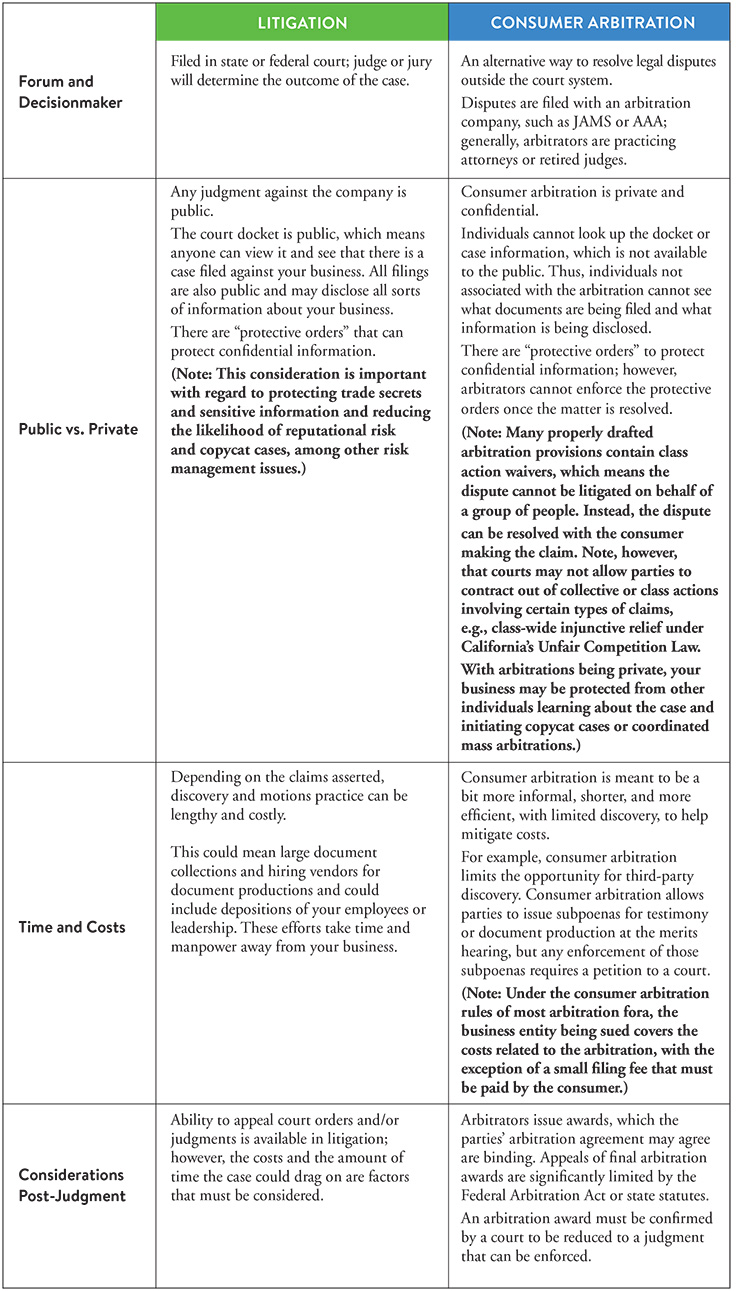May 31, 2024
To Litigate or to Arbitrate: That Is the Question!
You've been sued by a consumer. Now what?
First things first: What are your business's priorities regarding how and where the dispute is resolved? Should the dispute be resolved by a court, or could it be resolved through arbitration? Is this a matter your business may want to try and settle early? Does your business have a contract with the consumer? Does your contract have an arbitration provision? How can this dispute be resolved efficiently? These are some initial questions your business may consider when facing a lawsuit.
In most cases, it helps to look at your contracts with the consumer to answer some of these questions. Many contracts contain arbitration provisions that, in most cases, will steer any case strategy toward resolving the matter through arbitration. However, knowing what to expect in litigation and arbitration can help answer these initial questions and inform decisions when your business thinks about risk management for this and any potential future disputes. It's always good to understand the risks related to cost, length of time to resolution, and publicity when evaluating or re-evaluating any strategy.
So, back to the basics. What are some of the general differences between litigation and consumer arbitration? This side-by-side comparison should help illustrate those differences.

Now that the major differences between litigation and arbitration are laid out, where does settlement fit in? Litigation and arbitration both allow and encourage settlement discussions and agreements between the parties. With either of these two processes, settlement can be discussed at almost any point in time. However, if costs are a consideration, then settlement discussions at the initial stage may be most beneficial to mitigate exposure and legal costs down the road.
With this broad background in mind, how can understanding the differences between litigation and consumer arbitration inform your risk management and decision-making in potential future disputes? Some considerations could include:
- the parties and non-parties. Consumer complaints may contain allegations against a co-defendant or that implicate a third party, such as the dealership from which you buy retail installment sales contracts or even a vendor you work with. So, your company should ask:
- Do I want to preserve the business relationship with the vendor or third party?
- Could litigation affect that relationship?
- How could settlement affect that relationship?
- If arbitration is the road your business wants to take, is that vendor or third party subject to arbitration as well?
- the type of claim or dispute.
- Does the dispute involve issues or relief that are best resolved in arbitration?
- Is the claim one that could have implications across the industry such that your business wants to make a "statement" through the court system?
- Is this dispute something you may want to handle on your own, or do you want to engage counsel or outside counsel?
- the implications of a judgment or arbitral award.
- Is the dispute one that may require certain business practice and policy changes from your business? If so, is that something your business wants to be public?
- the use of your arbitration clause.
- In some cases, the parties may elect to waive arbitration and proceed in court.
Any business, whether small or large, can benefit from an overview of how legal disputes can be handled. If your company is not familiar with litigation or consumer arbitration, it is never too early to learn about the costs associated with each, the time it can take to get matters resolved, and the potential exposure your business could face. You never know when you may be hit with your first lawsuit. If your company is all too familiar with dispute resolution, then it may be a good idea to take another look at the differences between litigation and consumer arbitration to consider the overall costs to your business, the time involved, and the legal repercussions. 